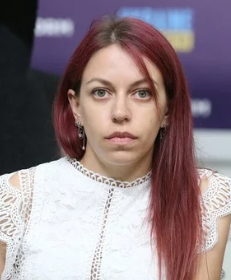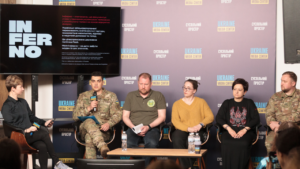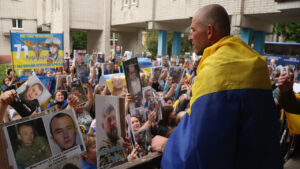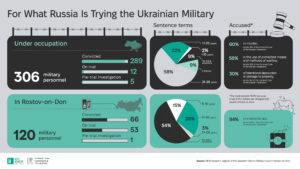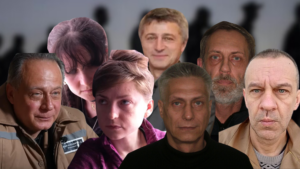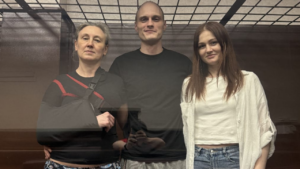A marine from the 501st Battalion. The story of Oleksiy Shevchenko, who is being denied medical assistance while in captivity
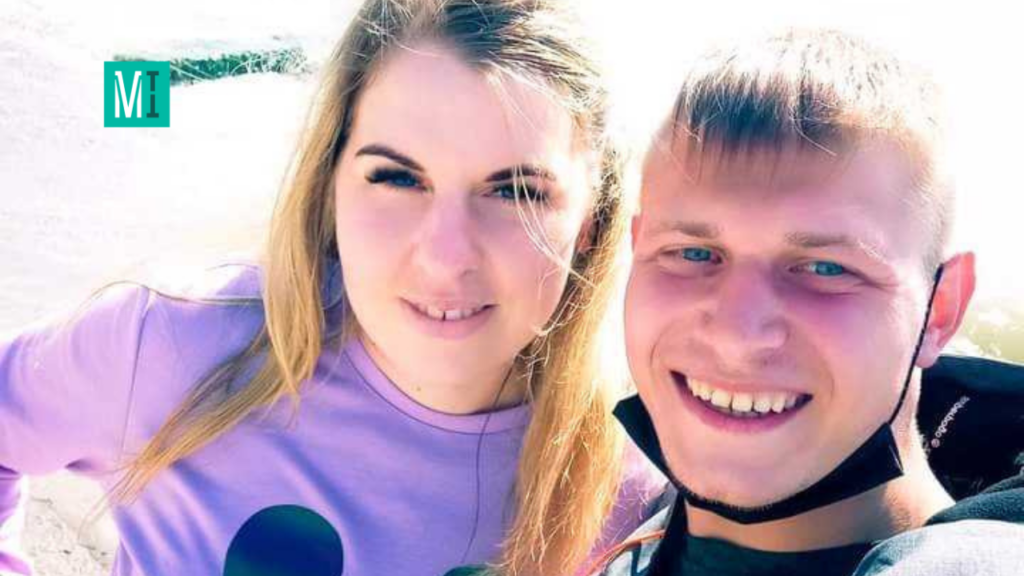
Oleksiy Shevchenko is a combat medic. He joined the military in 2017. At that time, he was a student but nonetheless voluntarily decided to sign a contract with the 501st Separate Marine Infantry Battalion. On 4 April 2022, while in Mariupol at the Illich Plant, he was taken prisoner of war. MIHR spoke with his sister Kateryna, who is fighting for her brother’s release. She says that Oleksiy suffers from asthma but is not receiving proper medical care while in captivity.
“We were like hand and glove”
Kateryna smiles as she talks about her brother. She says that from childhood he was very kind and sociable, always eager to help people. That is why he chose medicine as his profession.
“Oleksiy is an orphan. When he was six years old, his mother died, and he started living with his grandmother. When he turned eleven, his grandmother also passed away. He didn’t have anyone else left. My mother couldn’t stand aside, so I got a younger brother,” recalls Kateryna.
Oleksiy quickly became part of the new family, helping around the house and excelling in school. He was very active, loved to dance and participated in theatrical productions.
“When Oleksiy came into our lives, I was already in college. Once I came home for the weekend, and he called my mother ‘mom.’ Until that day, he had only seen me in photos, but as soon as I entered the yard, he ran to me shouting, ‘Sister!’ We were like hand and glove from then on.”

Oleksiy Shevchenko, a 26-year-old combat medic of the 501st Separate Marine Infantry Battalion. Photo from the family archive
When Kateryna started her own family, Oleksiy helped take care of her children. After finishing school, he enrolled in a medical college and later attended a medical university. He worked as a male nurse in the surgical department of the local hospital for a while, and later in the maternity ward. Then, one day, he called his sister and told her he was joining the military.
“I tried to dissuade him for a long time, but he didn’t give in to persuasion. He said that his hands were not needed in maternity, and that he would be more useful in the army,” says the sister of the prisoner of war.
Despite having chronic asthma, Oleksiy signed a contract with the Marine Corps. He decided that serving by the sea would have a positive impact on his health.
“His unit was based in Berdiansk for a long time, and he indeed rarely used the inhaler.”
In the 501st Battalion, Oleksiy Shevchenko served as a medic, often going to the combat zone. At the end of December 2021, his unit was sent to Shyrokyne in Donetsk Region.
In early February 2022, he called Kateryna warning her of the inevitability of a major war and advising her to prepare for evacuation to safer regions of Ukraine. However, his sister didn’t believe him, and when the major war began, communication with Oleksiy was lost.
They surrendered under a treacherous order
The marines spent 34 days in Shyrokyne. Natalia, a servicewoman of the 501st Battalion, recalls that time:
“We were attacked from all sides. There were too many Russian soldiers, who were advancing quickly. And then we were ordered to retreat to Mariupol.”
On 27 February 2022, the 501st Marine Infantry Battalion took up defense at the Illich Metallurgical Plant in Mariupol.
On 3 March 2022 Oleksiy Shevchenko got in touch for the first time since the onset of the major war.
“The fierce fighting was already underway in the city. He called and said that everything was fine, that he was still alive. I said, ‘What do you mean still alive?’ But he kept saying, ‘We’re all good here, I’m still alive,” recounts Kateryna.
Afterward, he called every three days, and the conversation lasted for about a minute. On 30 March Oleksiy celebrated his birthday. Kateryna greeted her brother and told him that she and her family had left to the western part of Ukraine.

The marine insisted that his family evacuate from the occupied territory as soon as possible. Photo from the family archive
“Oleksiy was really happy about it and said he’s now at ease for us. I asked him whether he had anything to eat. His reply was, ‘Well, of course I did. We have some water and a piece of bread,” recounts the sister of the prisoner of war.
On 3 April, Oleksiy Shevchenko wrote to Kateryna for the last time. He said there was no way out. At that time, Kateryna thought that was Oleksiy’s way of saying goodbye. But just two days later, information appeared on the Internet that more than 270 soldiers of one of the marine infantry battalions had been taken prisoners of war. It was Oleksiy Shevchenko’s unit. His family recognized him in one of the Russian videos.
“He looked so unlike himself. Without any gear, wearing some sneakers, unshaven, all dirty. But physically, he appeared unharmed,” says Kateryna.
This video was filmed in the village of Sartana in Donetsk Region, where the marines were held for several days. Later they were transported to Volnovakha Correctional Colony No. 120, better known as Olenivka.

Family members recognized Oleksiy in one of the videos released by the Russians immediately after the 501st Battalion was taken prisoners of war
For a long time, it was unclear how the entire Marine Infantry Battalion ended up as prisoners of war. There were talks that they had surrendered voluntarily. MIHR conducted an investigation and found out that two officers played a key role in this. These were Senior Lieutenant Kostiantyn Bezsmertnyi and Lieutenant Colonel Mykola Biriukov, the commander of the 501st Battalion. In May 2023, the State Bureau of Investigations notified Kostiantyn Bezsmertnyi of suspicion of high treason. The investigation revealed that after the fighters of the 501st Battalion had been taken prisoners of war, Kostiantyn Bezsmertnyi moved to the occupied city of Berdiansk in Zaporizhzhia Region, where he persuaded Ukrainian soldiers to switch sides and join the enemy. At least three relevant incidents that occurred in April-June 2022 are known to the investigation.

It is known from his social media that Kostiantyn Bezsmertnyi returned to Berdiansk after the 501st Battalion had been taken prisoners of war
According to information available to MIHR, Mykola Biriukov stayed in Olenivka for some time along with other marines. Later, he was transported to the Russian Federation where he stays to this day.
A Taser instead of an inhaler
In May 2022, the International Committee of the Red Cross confirmed Oleksiy Shevchenko’s status as a prisoner of war. However, the military enlistment office notified his family of his capture only in January 2023.
Kateryna had no information about Oleksiy for more than a year. She only saw him once in December 2022 in a photo published by Russia. Then, in the summer of 2023, after a major prisoner exchange, when 95 soldiers returned to Ukraine, Kateryna was contacted by a soldier who was kept in the same cell as Oleksiy.

A photo with Oleksiy was posted on Russian Internet resources in December 2022
He told Kateryna that Oleksiy Shevchenko’s health deteriorated, and asthma attacks became more frequent.
“Oleksiy taught his mates in the cell what to do when he has an attack. That’s how he survives in captivity,” says Kateryna.
She was told that her brother is not allowed to use the inhaler and is often denied medical assistance. Prisoners are forced to stand in the cell around the clock, their legs swell, and the wounds rot from constant beatings with batons.

Oleksiy Shevchenko and his sister Kateryna. Photo from the family archive
There again was no information about Oleksiy for the next six months. Prisoner exchanges between Russia and Ukraine ceased in August 2023 and resumed only this year. On 3 January 2024, Ukraine saw the return of the largest number of prisoners of war in the history of exchanges – 230 individuals. One of the released prisoners contacted Kateryna again.
“That guy cheered me up and said that everything was fine, that Oleksiy was given an inhaler. Yes, the conditions there are not the best, but my brother is holding on and waiting for release,” says Kateryna.
On 31 January 2024, another 207 soldiers returned from captivity. Among them were those who had been kept in the same cell as Oleksiy.
“One of the guys refused to say anything about my brother, just said that Oleksiy was doing fine. But another one told me that things were not going well for Oleksiy. He often had trouble breathing and developed heart problems,” says Kateryna.
The freed prisoner also said that Oleksiy Shevchenko was denied proper treatment and subjected to physical force.
“They don’t give Oleksiy an inhaler. When he has an attack, the guys knock on the door, and the guards come and take Oleksiy away. First, they shock him with a Taser, and then provide medical assistance. So they give him a choice: either ask for help, endure abuse and then be given an inhaler, or don’t ask at all,” Kateryna recounts the witness’s words.
He also mentioned that there were six people in Oleksiy’s cell. Some of them were released, while the rest were told that they were not needed by Ukraine.
Kateryna has appealed to the Ukrainian government and international organizations to release her brother from captivity. She has no means of communication with him. During almost two years of captivity, Oleksiy Shevchenko has been transported to four different detention facilities, three of which were in Russia.
The sister of the prisoner of war hopes that her brother will be exchanged soon, their family will be reunited again, and Oleksiy will continue his medical education as he dreamed.
So far, only 20 soldiers of the 501st Battalion have been released from captivity. More than 250 marines of this unit still remain prisoners of war.


